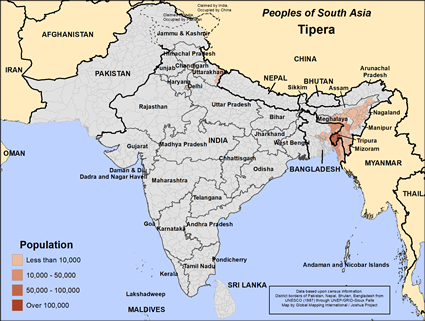Tipera in Bangladesh

Photo Source:
Tirengma - Wikimedia
Creative Commons
|

Map Source:
People Group data: Omid. Map geography: UNESCO / GMI. Map Design: Joshua Project.
|
| People Name: | Tipera |
| Country: | Bangladesh |
| 10/40 Window: | Yes |
| Population: | 151,000 |
| World Population: | 845,000 |
| Primary Language: | Kok Borok |
| Primary Religion: | Hinduism |
| Christian Adherents: | 3.72 % |
| Evangelicals: | 1.88 % |
| Scripture: | Complete Bible |
| Ministry Resources: | Yes |
| Jesus Film: | Yes |
| Audio Recordings: | Yes |
| People Cluster: | South Asia Tribal - other |
| Affinity Bloc: | South Asian Peoples |
| Progress Level: |
|
Introduction / History
The Tipera people's ancestors came from the Twipra/Tripura Kingdom. Through their own Manikya Dynasty they had their own kingdom of Tripura starting around 1400 and lasting 600 years. This kingdom straddled what is now Bangladesh and India's Tripura state, and the Tipera people still live in the same part of South Asia.
Since the eighteenth century, the Tipera have been dominated by foreign powers. They were first ruled by Mughals from India, then by Britain, then by Pakistan, and after 1971, by Bangladesh.
Since the 1960s, Bengali settlers migrating from the overcrowded plains of Bangladesh have flooded the Tipera homeland. Therefore, the Tipera are steadily being reduced to a minority in their own territory. Most still speak their own language, Kok Borok, but many are learning Bengali, the principal language in Bangladesh. Their Kok Borok language is related to that of the Bodo people. Bangladeshi Tipera live in the Chittagong Hills Tract district. The district is characterized by low mountains, hills and valleys all covered by dense tropical growth.
What Are Their Lives Like?
Rural Tipera live in small villages situated near the rivers in the valleys. Their homes are generally constructed of mud or bamboo, although a few wealthier families may own wooden homes with tile roofs.
Most Tipera are engaged in various types of farming. In the past, they practiced slash and burn agriculture, in which they would cut down a section of forest, burn the debris, and plant a variety of crops on the site. This practice was used for years in the highest parts of the hills, but today the Bangladesh government discourages the method and has encouraged the Tipera to practice plow cultivation in the lowland areas. The people grow cotton, yams, melons, pumpkins, maize, mangoes, oranges, pineapples and their staple food, rice. They keep various domestic animals including cattle, water buffaloes, pigs, goats and sheep. Their food is unusual for South Asia. One of their favorite foods is bamboo shoots and they have a number of dishes which are not spicy.
Many have made their way into the mainstream cultures both in India and Bangladesh. There are Tipera musicians, professional athletes and actresses. Some have served in government in various capacities.
What Are Their Beliefs?
The Tipera are nominally Hindu but are animists in practice, believing that non-human objects have spirits. They also have a number of shamanistic practices, which are based on the belief in a world of unseen gods and demons. They worship various gods of nature, such as those of fire, water and the forest. They believe shamans (priests), called ojhas, have great influence with the spirits of nature. The Tipera believe that it is bad luck for a kite to land on a roof, for a crow to caw on a roof, or to build a house where another has burned down.
What Are Their Needs?
The Tipera have staggering physical and spiritual needs. Medical care is poor, income is low, and illiteracy is high. Periodic cyclones and floods ravage their homeland causing widespread death and destruction.
Prayer Points
Ask the Lord to send dedicated laborers who understand the culture and needs of the Tipera people in Bangladesh.
Ask the Holy Spirit to bless the efforts of Christ bearers to the Tipera communities in India and Bangladesh.
Pray that God will save key Tipera leaders who will have opportunities to share the love of Christ with their own people.